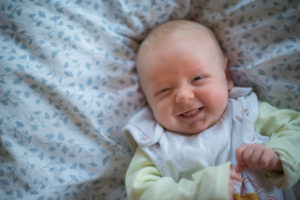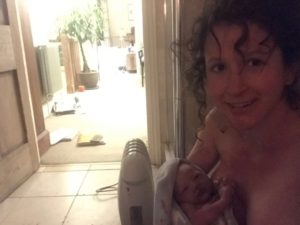 Oaklan came on the 5th October. He’s almost eleven weeks now and things are slowly starting to feel a little easier. I’m still pretty tired – and I’m writing this with him feeding on my lap – so please excuse any typos, half-formed ideas or clumsy phrasing.
Oaklan came on the 5th October. He’s almost eleven weeks now and things are slowly starting to feel a little easier. I’m still pretty tired – and I’m writing this with him feeding on my lap – so please excuse any typos, half-formed ideas or clumsy phrasing.
I wanted to get down some thoughts about early parenthood and mental health. It’s something I was pretty worried about. I was concerned about the lack of sleep and relentlessness of it, plus not being able to exercise enough and dealing with a very different shaped body.
I was on 50mg of Sertraline throughout my pregnancy (a decision that was definitely the right one for me) and I chose to increase this to 75mg in the first difficult weeks. I think that’s helped. But, despite everything, early parenthood has also highlighted some healthier thinking patterns and approaches.
The achievement of labour and birth
 I’d hoped that pregnancy would change my muddled relationship with my body. I’ve heard women say that it helps them see their bodies in a new light and recover from long-term eating problems. This didn’t happen for me. The whole nine months was an uncomfortable struggle with my changing body. I felt trapped and out of control. By 41 weeks I was desperate not to be pregnant. But labour and birth were more empowering. After seven hours of contractions, he came so fast I delivered him myself at home. An hour ago the midwife on the phone had told us I was still in early labour. We were lucky but it’s still an experience I’m proud of. I finally managed to see my body as something special and cut it a bit of slack (at least for the first six weeks or so).
I’d hoped that pregnancy would change my muddled relationship with my body. I’ve heard women say that it helps them see their bodies in a new light and recover from long-term eating problems. This didn’t happen for me. The whole nine months was an uncomfortable struggle with my changing body. I felt trapped and out of control. By 41 weeks I was desperate not to be pregnant. But labour and birth were more empowering. After seven hours of contractions, he came so fast I delivered him myself at home. An hour ago the midwife on the phone had told us I was still in early labour. We were lucky but it’s still an experience I’m proud of. I finally managed to see my body as something special and cut it a bit of slack (at least for the first six weeks or so).
Being forced to sit with weight anxiety and managing lack of exercise
After the first six weeks, real life kicked in – and a bad hip (from running too soon!) made it impossible to even walk for a week. I got incredibly frustrated and miserable about the lack of exercise and the weight I’d gained – and was continuing to gain as I rested my hip. But, while this was extremely hard, I was forced to cope with the weight gain and sit with that discomfort. This is something I’ve never really managed to do before without taking action to reduce it (usually intense exercise).
It made me think of exposure and response prevention (ERP) (usually used to treat OCD). In ERP people are exposed to situations that make them feel very anxious or uncomfortable and supported to tolerate the anxiety and let this feeling fade of its own accord rather than taking action to reduce it in the short term (but not dealing with the underlying issues). In a similar way, the anxiety about a changed body shape did start to fade of its own accord. Not entirely of course but enough to create a new normal and help me live with it.
Avoiding thought errors/negative thinking
Cognitive behaviour therapy helps us identify and manage negative and unhelpful automatic thoughts. The changeable nature of early parenthood and the complete lack of newborn patterns and routines means that my natural negative automatic thoughts (for example a tendency to catastrophise and over generalise) are shown to be more obviously a flawed way of thinking. It’s easy to think that a bad day or a sleepless night is a pattern that will last forever – and feel worse still. In fact the next day can be utterly different both practically and emotionally. And by the next week there’s a totally new set of pleasures and problems. Right now, he’s full of cold and I’m struggling after five nights of very little sleep. But the knowledge it won’t last forever definitely helps.
Parenting a newborn also forces you to live in the moment. When things are good I need to enjoy it while it’s happening and appreciate the little moments of joy. Plus a bike ride or a hot bath has never felt so blissful.
Flexible thinking and relinquishing control
In a similar vein, I’m forced to relinquish control over my days and think in a more flexible way. Trying to impose too much of a routine or make and keep detailed plans is a bit of hiding to nothing. I’m learning to take a deep breath and take things as they come.
Acceptance rather than trying to rationalise
Mindfulness taught me to try and accept feelings rather than try to rationalise or ‘solve’ them by ongoing rumination. I’ve also had to learn to accept whatever Oaklan throws at me – and to realise that sometimes there isn’t a rational answer. Sometimes he just screams for no reason – thankfully less so than he used to.
And on the other side of the coin, rationally I couldn’t make sense of coping on 2/3 hours sleep a night for a week. But somehow, the hormones and the necessity mean that I do. I’m learning to go with what actually happens day by day, rather than what ‘rationally’ should be the case.
Taking things slow and breathing deeply
I’m generally quite a hectic person. I rush from one thing to the next, fill my day and work from lists and plans. I keep going until I’m exhausted. But Oaklan is happiest when things are more relaxed, when days are gentler. He picks up on my stress and it upsets him. As I breathe deeply he calms down. It’s been a good lesson in taking things slow.
Who knows what next week, month or year will bring. There’ll definitely be plenty more tears as well as the joys of watching him grow. There’s already been a lot of learning – about myself and about him. Hopefully there’ll be plenty more.

2 thoughts on “Thoughts on mental health and parenting a newborn”